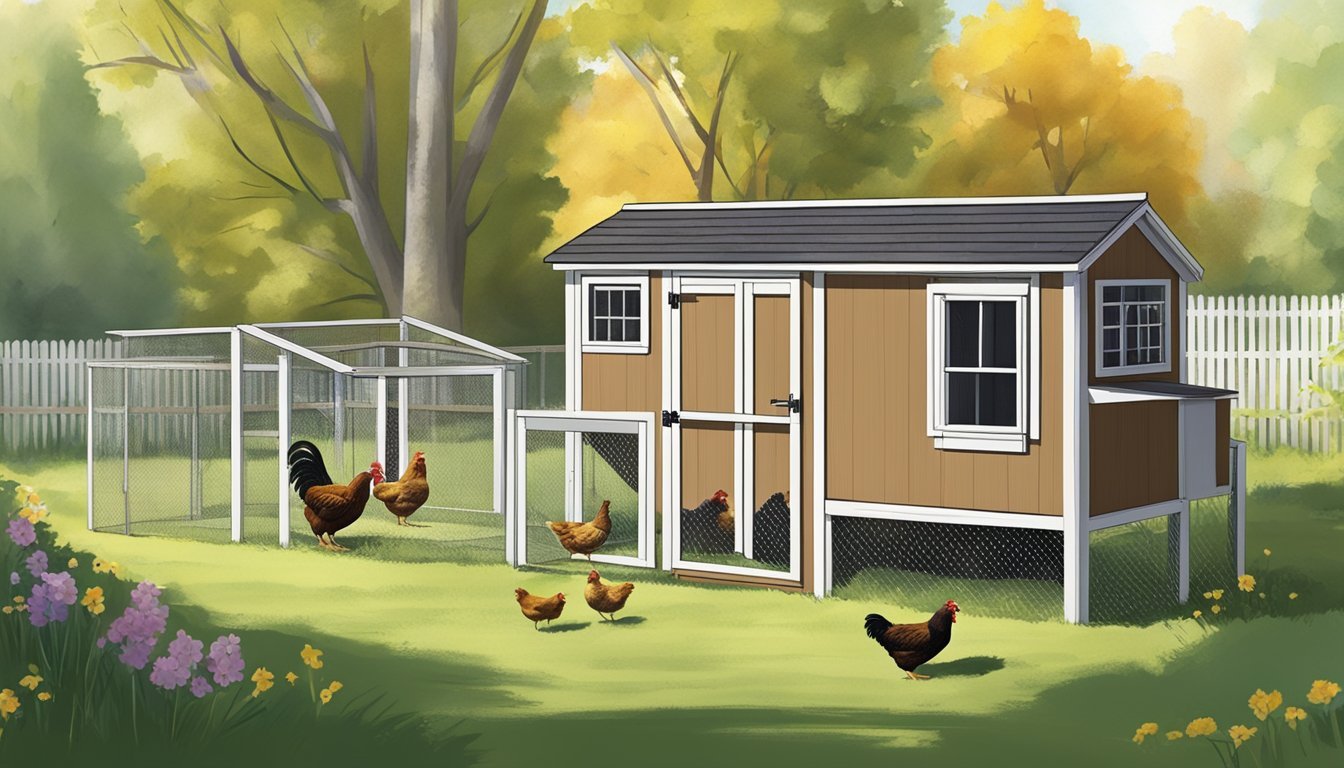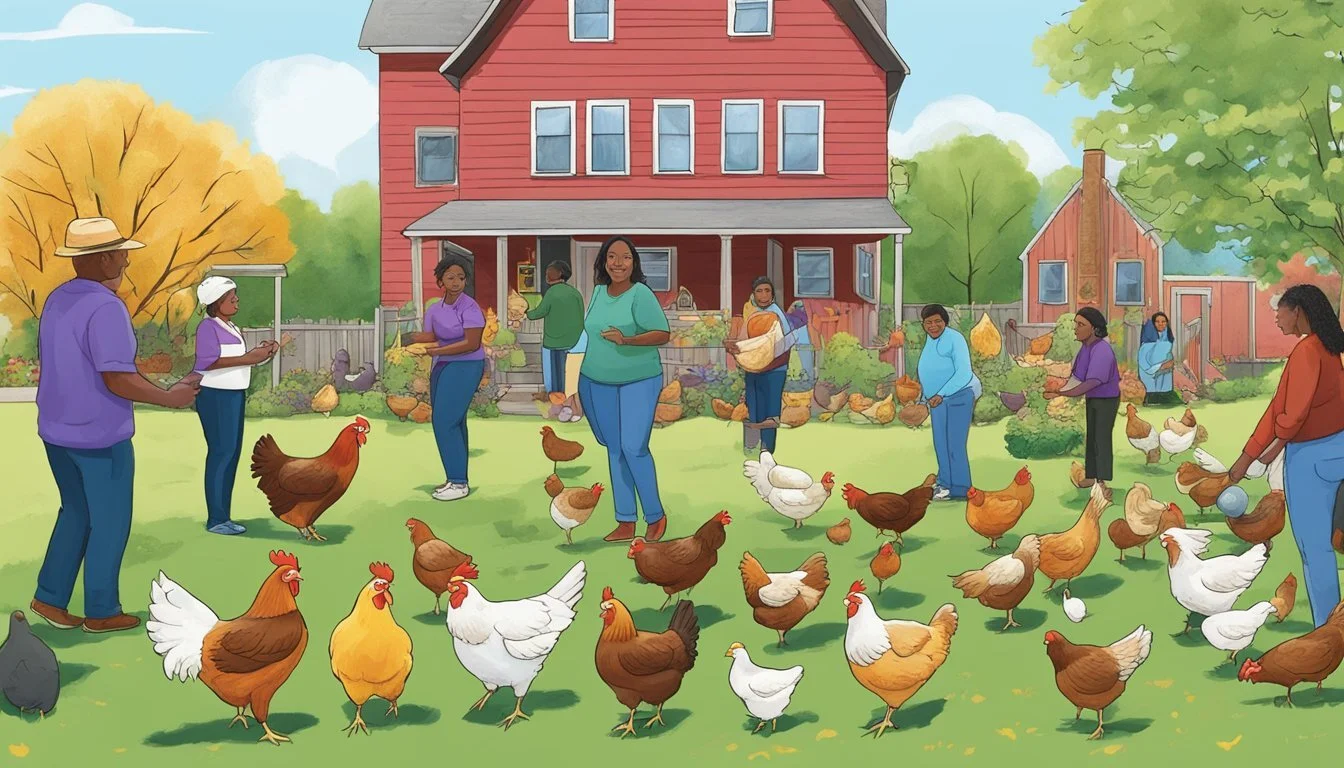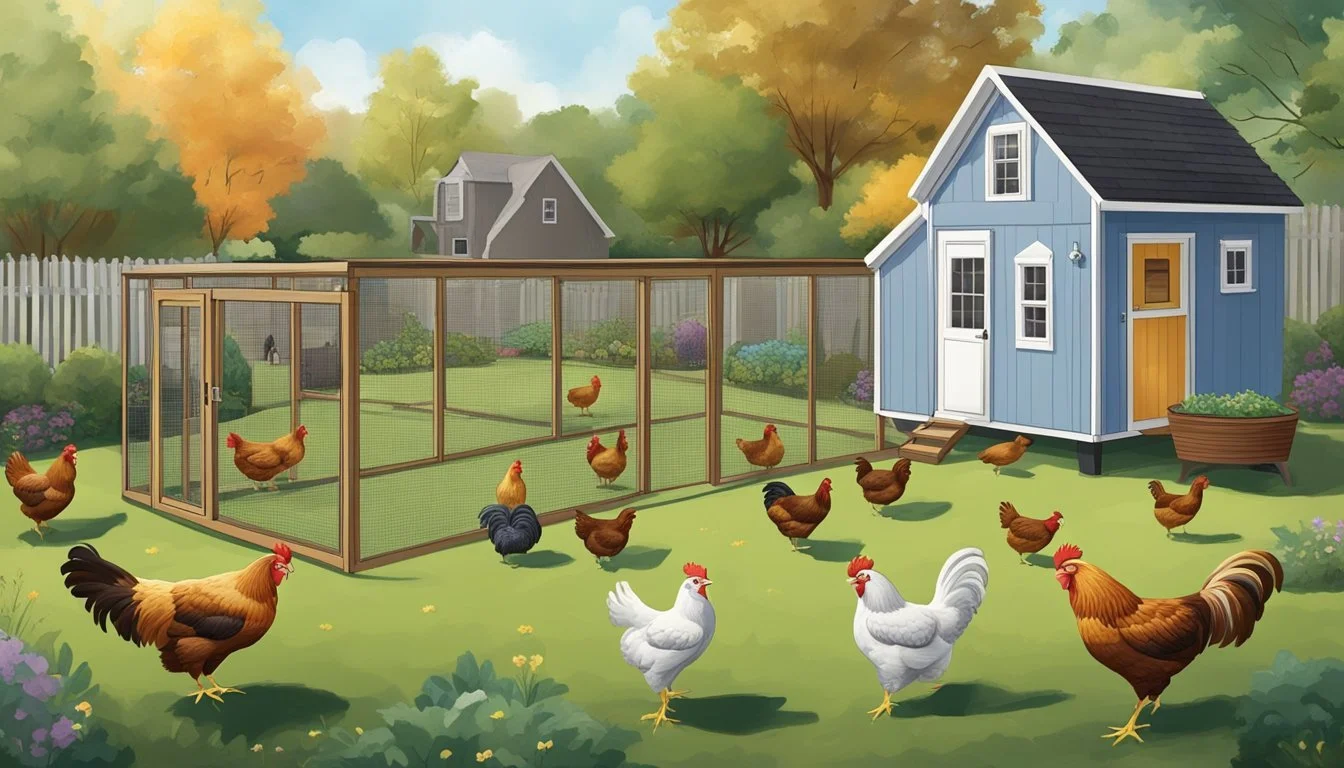Keeping Backyard Chickens in Albany, NY
Essential Guidelines for Urban Poultry Farmers
Urban chicken keeping has become increasingly popular in cities across the United States, reflecting a growing interest in sustainable living practices and local food sources. In the capital city of New York, Albany, this trend has led to legislative changes allowing residents to participate in the raising of backyard chickens. With these changes, Albany has joined a number of cities that have adjusted their regulations to accommodate the desires of urban homesteaders, while considering the impact on the community and local environment.
In Albany, the regulations specify that residents can keep up to six hens, but roosters are prohibited to prevent noise disturbances. The city acknowledges the benefits of backyard chickens which include providing fresh eggs, natural pest control, and the enjoyment of animal care. Before obtaining chickens, however, Albany residents must secure a license from the City Clerk’s office, which involves a fee and ensures that chicken keepers are accountable and adhere to city guidelines designed to protect both the chickens and the community.
These rules are framed to balance the interests of those wishing to keep chickens with potential concerns such as noise, odors, and attracting predators or rodents. Furthermore, the conditions of the chicken coop must meet specified size requirements, reinforcing the city's commitment to the welfare of the birds. Regulations such as these reflect a thorough and nuanced approach to integrating backyard chickens into the urban fabric of Albany, New York.
Understanding Local Chicken Ordinances
In Albany, NY, residents who wish to raise backyard chickens must navigate specific municipal regulations to ensure legal compliance. Local ordinances determine the legality of keeping chickens, and attention to detail is crucial for any prospective or current chicken owner.
City Specific Regulations
The City of Albany permits residents to keep up to six hens in their backyards. This regulation is a clear guideline intended to balance urban farming with neighborhood considerations. However, it's important to note that roosters are not permitted within city limits to prevent noise complaints and maintain peace in residential areas.
Permits and Licensing Requirements
A permit is required to legally keep backyard chickens. To obtain this, residents must apply for a license from the City Clerk. This process ensures that chicken owners are accountable, and it helps the city maintain records of where and how many chickens are being kept.
The Role of the Albany Common Council
The Albany Common Council plays a pivotal role in the issuance and enforcement of chicken ordinances. They are responsible for passing legal directives that define and regulate the activity of raising backyard chickens. The Council’s decisions directly impact chicken laws, such as the ordinance enacted on July 1, 2019, that legalized the keeping of backyard hens in the city.
Setting Up Your Chicken Coop
Creating an appropriate environment for backyard chickens involves careful planning of the coop design and ensuring it reflects the principles of sustainability, effectiveness in protecting the chickens, stands up to predators, and fits well within the given backyard space.
Coop Design and Location
The design of a chicken coop should accommodate at least 4 square feet per bird inside the coop and 10 square feet per bird in an attached run. Important elements include:
Ventilation: At least one square foot of ventilation per bird but positioned to prevent drafts in colder weather.
Spacing: Approximately one linear foot of roosting space per bird.
Accessibility: The coop must be accessible for cleaning and egg collection.
Sunlight: Location should ensure the coop receives adequate sunlight, which helps maintain the health and productivity of the hens.
Drainage: Elevated positions or sloped locations are ideal for proper drainage during wet conditions.
Safety and Protection from Predators
Chickens require protection from a variety of predators such as foxes, raccoons, and birds of prey. Key elements in ensuring safety include:
Fencing: A strong, buried fence around the coop and run is vital to deterring digging predators.
Locks: Secure, predator-proof locks should be used on all access points.
Hardware Cloth: Utilizing hardware cloth instead of chicken wire provides better defense against smaller predators.
Regular Checks: Regular inspection of the coop and fenced area for signs of attempted entry or weak points is necessary for ongoing protection.
By adhering to these guidelines, one can ensure that their backyard coops provide a safe and sustainable habitat for their chickens.
The Essentials of Chicken Care
Proper care is crucial for the well-being of backyard chickens in Albany, NY. Owners must ensure a balanced diet and uphold robust health standards to prevent disease and promote egg production.
Feeding and Nutrition
Chickens require a balanced diet to maintain their health and productivity. A proper feeding regimen includes:
Starter Feed: Chicks should be given starter feed that is high in protein, typically about 20-24%, to support their rapid growth.
Layer Feed: At approximately 18 weeks or when hens begin laying eggs, transition them to layer feed with 16-18% protein and increased calcium for strong eggshells.
Grit: Offering poultry grit helps chickens digest their food efficiently, as it aids in grinding down the feed in their gizzard.
Clean Water: Always provide access to fresh, clean water. Change the water regularly to prevent contamination.
Remember, treats should not exceed 10% of the chickens' overall diet, and scraps should be given in moderation.
Health and Disease Prevention
Chickens can be susceptible to a variety of diseases, which can affect public health if not properly managed. Key prevention measures include:
Vaccinations: Ensure chickens are vaccinated against common diseases, following veterinary guidance.
Biosecurity: Implement biosecurity measures such as regular coop cleaning, vermin control, and isolation of new or sick birds.
Parasite Control: Regularly check for and treat external and internal parasites, including mites, lice, and worms.
Observation: Monitor the flock daily for signs of illness, such as changes in behavior, appearance, and egg production. Promptly address any health concerns.
Maintaining the health of chickens helps safeguard both the flock and public health, ensuring a safe and productive backyard chicken experience.
Legal Considerations and Compliance
Residents of Albany, NY interested in keeping backyard chickens must adhere to specific municipal regulations designed to ensure public safety and satisfaction. These rules encompass obtaining necessary permits, considering neighbor consent, and adhering to slaughter and selling restrictions.
Neighbor Consent and Property Values
Individuals must consult their neighbors before setting up a backyard coop, as the presence of chickens can potentially affect surrounding property values. The city may require a Neighbor Consent Provision, ensuring that the introduction of chickens does not become a source of contention or lead to a decline in the neighborhood's real estate worth.
Slaughter and Selling Regulations
The city of Albany prohibits the outdoor slaughtering of chickens. Residents must process chickens indoors or off-site to comply with city regulations. Moreover, the laws pertaining to the selling of chickens and their eggs are stringent, often requiring proper Permits and adherence to health guidelines to ensure the safety of consumers.
Slaughtering: The act must be performed indoors or offsite.
Selling: Requires following health code regulations and obtaining permits.
Liability and Nuisance Issues
Owners are liable for any nuisance issues arising from their chickens. They are required to maintain clean and secure coops to prevent odors, noise, and potential health hazards. The city enforces regulations designed to minimize Nuisance, including maintaining a certain distance from neighboring dwellings and ensuring that chickens do not run at large.
Liability: Owners are responsible for their chickens' impact on the community.
Noise: Roosters are typically not allowed due to noise complaints.
Engaging with the Community
When considering the integration of backyard chickens into Albany, NY's urban life, community engagement plays a critical role. The passage of the backyard chicken ordinance and the ongoing support for urban farming are underpinned by active advocacy and educational initiatives.
Local Chicken Farming Advocacy
The Common Council's vote in favor of allowing backyard hens was a pivotal moment for Albany's sustainability advocates. This legislative outcome was influenced by robust advocacy from community groups and council members who recognized the benefits of local farming practices. Jerry Jennings, a former mayor, had been known to be supportive of urban garden initiatives, reflecting the city's move towards a healthier lifestyle.
Key Advocates in Local Farming:
City residents
Youth Organics (YO!)
Mansion and Pine Hills neighborhood organizations
Educational Resources and Events
Educational resources are essential for residents to understand best practices in chicken keeping. Through workshops, urban farming events, and resources disseminated by advocates, Albany's citizens can learn about responsible and healthy backyard chicken care.
Events and resources include:
Workshops on Coop Building: Teaching residents how to build sustainable coops for their backyard chickens.
Care Classes: Offering guidelines on the proper care and feeding of chickens to promote animal welfare and health.
Sustainability Seminars: Highlighting the role of backyard chickens in waste reduction and garden health.
By fostering an environment of learning and active participation, Albany strengthens its commitment to urban agriculture and sustainable living.
Land Use and Urban Agriculture
As urban agriculture gains traction, cities like Albany, New York, are adapting land use regulations to support sustainable food systems. These changes address the raising of farm animals, such as chickens, and the cultivation of gardens.
Impact on Local Ecosystem
Urban agriculture, when managed responsibly, can have a positive effect on the local ecosystem in Albany. The inclusion of backyard chickens and gardens plays a role in reducing food miles and associated emissions. However, the city's residents must also consider potential challenges. Chickens, for instance, might attract predators or create waste management issues if not properly contained and cared for. On the other hand, thriving gardens can bolster local biodiversity and help manage weeds.
Animals: Increasing biodiversity, potential for attracting pests
Weeds: Garden cultivation can suppress weed growth
Gardens and Producing Food at Home
In Albany, residents who cultivate personal gardens contribute to the city's food self-reliance. Home gardens vary in size and scope, but even small plots can significantly impact household food supply and quality. They offer fresh produce that can reduce reliance on external sources and can also mitigate some issues related to ticks and weeds through natural, non-chemical means.
Gardens: Source of fresh, healthy food; natural weed control
Ticks: Reduction achievable through landscape management and poultry presence
The integration of animals and gardens into urban environments supports the development of self-sufficient, sustainable local food systems, while promoting ecological health and community well-being.
Addressing Common Concerns
Keeping backyard chickens in Albany, NY requires considering potential nuisances such as noise and odors that may impact neighbors. Regulations and ordinances are in place to maintain public health and ensure that chicken keeping is managed responsibly.
Dealing with Noise and Smells
Noise: One of Albany's ordinances ensures a peaceful environment by prohibiting roosters, which are known for their loud crowing. Residents are allowed to keep up to six hens, which are considerably quieter.
Odor Management: Homeowners are responsible for maintaining a clean and healthy living space for their chickens. This involves regular cleaning of coops to minimize smells. Compliance with these practices prevents public nuisance and protects public health.
Managing Waste and Composting
Waste Management: Chicken waste is a fact of poultry care, but it can be turned into a positive resource with the proper approach.
Composting: By composting chicken manure, Albany residents can convert waste into beneficial garden fertilizer. However, it is crucial to follow New York State composting guidelines to maintain a healthy and odor-free composting system.
Comparative Analysis of Regional Policies
The regulatory landscape for keeping backyard chickens varies significantly across New York State, reflecting differing community values and urban planning goals.
Comparison with Other New York Cities
New York City: The metropolis maintains a prohibition on keeping roosters but allows hens, fostering a community of urban farmers while controlling noise levels.
Buffalo: In contrast, Buffalo permits residents to keep up to six chickens, but requires a distance of at least 20 feet from any neighboring dwelling.
Rochester: Rochester also has rules in place that allow urban chicken farming but mandates coops to be at least 25 feet away from neighbors and limits the number to four hens.
Schenectady: This city allows for a larger flock, with up to six hens, but no roosters, echoing Albany's regulations to some extent.
New Rochelle and Utica have not been as forward in defining their stances on urban chicken keeping, and it is advised to check with local government for current ordinances.
Table Example:
City Number of Hens Allowed Rooster Policy Additional Restrictions New York City Unlimited (hens only) Prohibited None specified Buffalo Up to 6 Prohibited 20 feet from dwellings Rochester Up to 4 Prohibited 25 feet from neighbors Schenectady Up to 6 Prohibited None specified Albany Up to 6 Prohibited License required from City Clerk
Statewide Trends and Legislation
The state of New York does not have overarching legislation governing the keeping of backyard chickens; instead, it allows municipalities to set their own ordinances. Local officials like Owusu Anane, Tom Hoey, and Judy Doesschate often play pivotal roles in shaping these policies, as seen in Albany's recent legislative changes.
In terms of wider trends:
Syracuse: Reflects the statewide move towards urban agriculture, allowing residents to keep up to eight chickens, with certain stipulations to avoid nuisances to neighbors.
State Considerations: The lack of state-level legislation creates a patchwork of regulations, but also allows cities to adapt rules that suit their unique urban dynamics.
Backyard Chickens in Albany: After contentious debates, Albany's Common Council passed an ordinance allowing up to six hens but no roosters, aligning with several other New York cities in promoting urban homesteading while balancing community concerns.
Conclusion
Residents in Albany, NY, benefit from the passage of an ordinance allowing them to raise hens in their backyards. This urban agricultural practice, however, comes with stipulations to ensure neighborly peace and public health.
The key points include:
Enclosure Regulations: Hens must be kept in a designated enclosure or fenced area.
Distance Requirements: Enclosures should be at least 25 feet away from any occupied residential dwelling on an adjoining property.
Restriction on Roosters: Keeping roosters is typically prohibited due to noise concerns.
This ordinance enables citizens to enjoy fresh eggs and the experience of raising chickens, while also adhering to specific guidelines designed to maintain order and sanitation in the urban environment. It is important for current and prospective chicken keepers to stay informed about these local laws to ensure compliance and community harmony.










